We asked Americans what they think about the value of a four-year college degree from a few different angles:
- Is a degree important in order for someone to get a well-paying job in today’s economy?
- Has the value of a degree changed in recent decades?
- Can someone without a degree get a well-paying job?
- How useful do people think their own education was in preparing them for a well-paying job?
- Is the cost of college worth it today?
The importance of a four-year college degree
Four-in-ten Americans say it is not too or not at all important to have a four-year college degree in order to get a well-paying job in today’s economy.
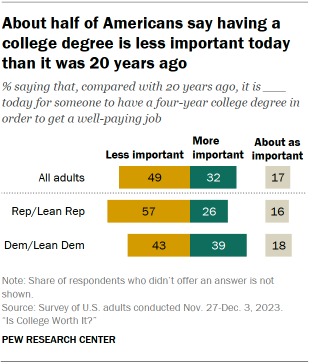
Only 25% say it’s extremely or very important to have a college degree, and 35% say it’s somewhat important.
We also asked the public about the importance of a college degree now versus 20 years ago.
About half of Americans (49%) say it’s less important today than it was in the past for someone to have a four-year degree in order to get a well-paying job. About a third (32%) say having a degree is more important now, and 17% say its importance hasn’t really changed.
Differences by party
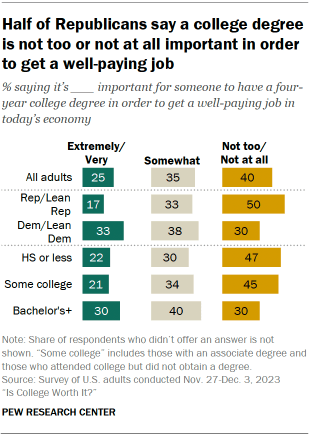
Half of Republicans and Republican-leaning independents – compared with 30% of Democrats and Democratic leaners – say it’s not too or not at all important to have a four-year college degree to get a well-paying job.
And a majority of Republicans (57%) say having a degree is less important today than it was 20 years ago; 43% of Democrats say the same.
These partisan gaps hold even after controlling for differences in the educational attainment of Republicans and Democrats.
Differences by education
College graduates are more likely than those with less education to say that having a college degree is extremely or very important (30% vs. 22%).
But views on whether having a college degree is more or less important today than it was 20 years ago don’t differ significantly by education. Roughly half of four-year college graduates (51%) and those with less education (48%) say it’s less important today for someone to have a college degree than it was in the past.
Adults with a postgraduate degree, however, have somewhat different views than those with a bachelor’s degree on both of these measures. Some 35% of postgraduates say it’s extremely or very important to have a four-year college degree in order to get a well-paying job, compared with 27% of those whose highest attainment is a bachelor’s degree.
And 39% of postgraduates – compared with 30% of those with a bachelor’s degree – say it’s more important to have a college degree today than it was 20 years ago.
Differences by age
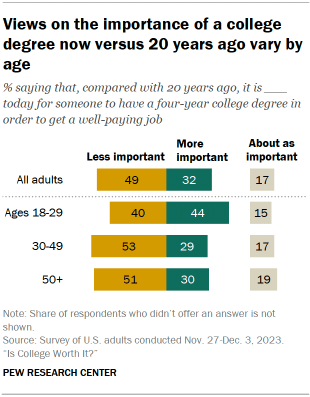
Young adults stand out in their views on the importance of a college degree today versus in the past.
Among those ages 18 to 29, 44% say having a degree is more important today in order to get a well-paying job than it was 20 years ago. By comparison, 29% of those 30 to 49 and 30% of those 50 and older say the same.
Getting a high-paying job without a college degree
Americans also have mixed views when it comes to whether someone without a four-year college degree could get a well-paying job in today’s economy.
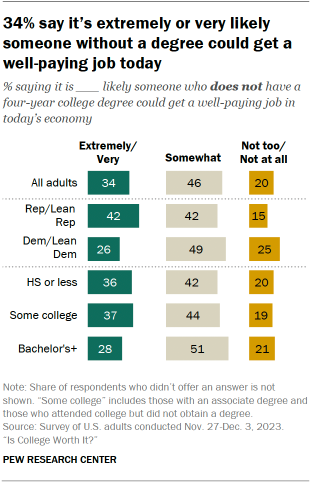
Only about a third (34%) say it’s extremely or very likely that someone withouta four-year degree could get this kind of job.
Nearly half say it’s somewhat likely that someone without a college degree could get a well-paying job, and 20% say it’s not too or not at all likely.
These views differ by:
- Partisanship: 42% of Republicans and 26% of Democrats say it’s extremely or very likely someone without a four-year degree could get a well-paying job. Among Democrats, 25% say it’s not too or not at all likely; just 15% of Republicans say the same.
- Education: 28% of adults with at least a bachelor’s degree say it’s extremely or very likely that someone without a college degree could get a well-paying job today. This compares with 37% of those with some college and 36% of those with a high school diploma or less education.
Do Americans think their education prepared them for the workplace?
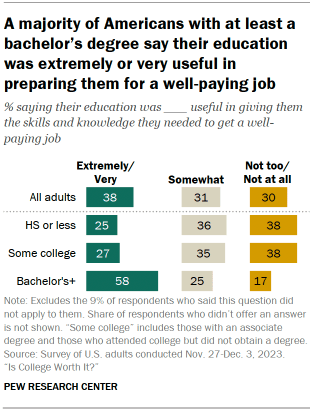
When thinking about how useful their own education was in giving them the skills and knowledge needed to get a well-paying job, a majority of those with a four-year college degree or more education (58%) say it was extremely or very useful. (This finding excludes the 9% of respondents who said this question did not apply to them.)
Adults with a postgraduate degree are especially likely to say their education was extremely or very useful: 72% say this, compared with 47% of those whose highest attainment is a bachelor’s.
By comparison, adults with less education have more mixed views. Among those who have not completed a bachelor’s degree, 38% say their education was not too or not at all useful in giving them the skills and knowledge needed to get a well-paying job; 35% say it was somewhat useful, and 26% say it was extremely or very useful.
These views don’t differ as substantially by age or by party.
Is college worth the cost?
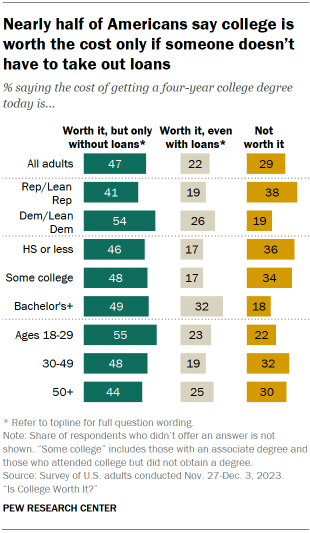
When asked about the cost of college these days, many Americans question whether it’s worth it if a student has to take on debt. Nearly half of adults (47%) say a four-year college degree is worth the cost, but only if someone doesn’t have to take out loans in order to attend.
Only 22% say college is worth the cost even if someone has to take out loans. And 29% say college isn’t worth the cost.
Meanwhile, data from the Federal Reserve shows that more than four-in-ten adults who attended college say they took out student loans for their education.
Views on the value of college differ by partisanship, education and age. But notably, in all groups except for Republicans, pluralities say the cost of college is worth it only if someone doesn’t have to take out loans.
Differences by party
A narrow majority of Democrats (54%) say the cost of getting a four-year college degree is worth it, but only if someone doesn’t have to take out loans. A smaller share of Republicans (41%) say the same.
About one-in-four Democrats (26%), compared with 19% of Republicans, say the cost is worth it even with loans.
Republicans are twice as likely as Democrats to say college is not worth the cost (38% vs. 19%).
Differences by education
Americans with at least a four-year college degree are much more likely than those with less education to say that college is worth the cost even if someone has to take out loans (32% vs. 17%).
Those with a postgraduate degree are among the most likely to express this view: 37% say college is worth the cost even after taking out loans. This compares with 29% among those with a bachelor’s but no postgraduate degree.
Even so, across all education levels, more say a four-year degree is worth the cost only if someone doesn’t take on debt than say it’s worth the cost with debt.
Those with some college or less education are about twice as likely as those with at least a bachelor’s degree to say the cost of getting a degree isn’t worth it at all (35% vs. 18%).
Differences by age
Young adults are more likely than their older counterparts to say the cost of a degree is worth it only if someone doesn’t take out loans: 55% of those ages 18 to 29 say this, compared with 48% of those 30 to 49 and 44% of those 50 and older.
And 18- to 29-year-olds are less likely to say the cost isn’t worth it at all (22% vs. roughly three-in-ten among older age groups).




